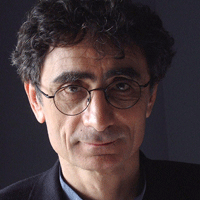
- In the Realm of Hungry Ghosts
- Random House (2008)
A man who has seen many demons found himself, last week, at the podium of a packed church musing on our notion of God. But Dr. Gabor Maté, Vancouver Downtown Eastside physician, author and social activist was more interested in finding a higher power not through blame, but possibility.
His topic was "The Globalization of Addiction." Maté dedicated the evening to the memory of a woman he called Serena in his new book, In the Realm of Hungry Ghosts. Buried on the same day of this community forum, Serena was a patient at the non-profit Portland Hotel on East Hastings. One of the many faces of addiction on the Downtown Eastside, she was a young woman ravaged by severe sexual abuse, neglect and dysfunction, and her death, in Maté's words, is indicative of a massive failure of society, science and compassion.
"The war on drugs. . . the war on drugs," Maté mused solemnly. "This is not a war on drugs. This is a war on drug addicts. We ask ourselves why people give up their lives, their relationships, their connections in this world, for the pursuit of a drug. Addiction can never be understood if looked at through the lens of moralism and judgement. It's time as a society we ask not: 'Why the addiction?' But: 'Why the pain?'"
He further claimed this war has not been a mistake but rather a political, emotional and spiritual corruption we all share. "At the political level, it controls the population of our most downtrodden. Emotionally, we are all addicted to negative behaviour for our short term gain, and spiritually, we marginalize the addict because we do not want to look at the mirror they are holding up to us. We fear the parts in ourselves we don't want to see."
Uncomfortable message
Maté is a man of science who has in the past made the scientific community uncomfortable. His insistence on combining research on brain biochemistry with matters of spirit, emotional pain and environmental nurturing has received criticism despite the mind, body and spirit health movement that has infiltrated mainstream sensibilities. Following the release of When the Body Says No, an exploration of the link between repressed emotion and disease, critics accused him of suggesting the ill blame themselves for their health woes. Maté implies through his work, however, that blame is not his aim, and that we are simply afraid of examining the root of what ails us.
And one of those demons that ails us is addiction. While In the Realm of Hungry Ghosts is a natural evolution of Maté's previous works and a stunning portrayal of the lives of addicts, more importantly he makes it clear that addiction touches every sector in society, be self-destructive indulgence in drugs, alcohol, sex, eating, shopping or work. In the hallowed grandness of the West End's St. Andrew's Wesley Church, he mentioned another institution, prison, the current home of Lord Conrad Black, whose drug of choice appears to be power. "That is a man with low self-esteem," Maté said. "No one with high self-esteem seeks to be called a lord of anything. Addiction to status led to contempt for the law."
So if no one is immune to addiction, who is then most susceptible? Maté marries his clinical experiences with new research to claim the root of addiction is in formative brain chemicals. He says the first five years of life and even the environment in the womb can dictate a predisposition to addiction, and uses recent studies to connect stress, abuse and lack of love and attachment to deficiencies in our ability to create endorphins and dopamine -- necessary chemicals in our bodies that give us both pleasure and pain relief.
Maté claims it is no coincidence that emotional and physical pain is interpreted in the same place in the brain and leads us to self-medicate when we are lacking these receptors. He suggests addicts are not addicted to the substance at all, but rather to their own brain chemicals.
An audience member aptly quoted Allen Ginsberg in saying perhaps we've literally been "frightened out of our natural ecstasy."
Embrace of addiction
In sharing the tale of an addict who likened heroin to a mother's hug, Maté's message of compassion was clear. In his years of treating sex trade workers, he stressed that without exception, every single addict was a victim of neglect, abandonment or abuse. These are not facts Maté could ignore as he wrote In the Realm of Hungry Ghosts, and following the burial of yet another one of his patients, he stressed addiction was a lonely journey. He wanted to use a Beatles lyric in his book to approach ideas of "saving souls" with love, but in the interest of copyright complications, instead tossed about the Buddhist philosophy that purity belongs to oneself, as no one can purify another.
In a response to a man who queried the idea of "tough love" in the loss of his brother to the Downtown Eastside, Maté replied, "Forget tough love. Love is enough. Your biggest challenge is to fully accept him while protecting yourself and your boundaries."
Despite spirit and science being uneasy bedfellows, Maté remains unwavering in his frustration with the medical community, the government and the media. He says they are simply not reading the research. While the institutions scramble around for band-aids to soothe the ever increasing fallout of addiction, increasing numbers of people are willing to look at holistic common sense. "Only in the presence of compassion," Gabor Maté insisted, "will people see the truth."




